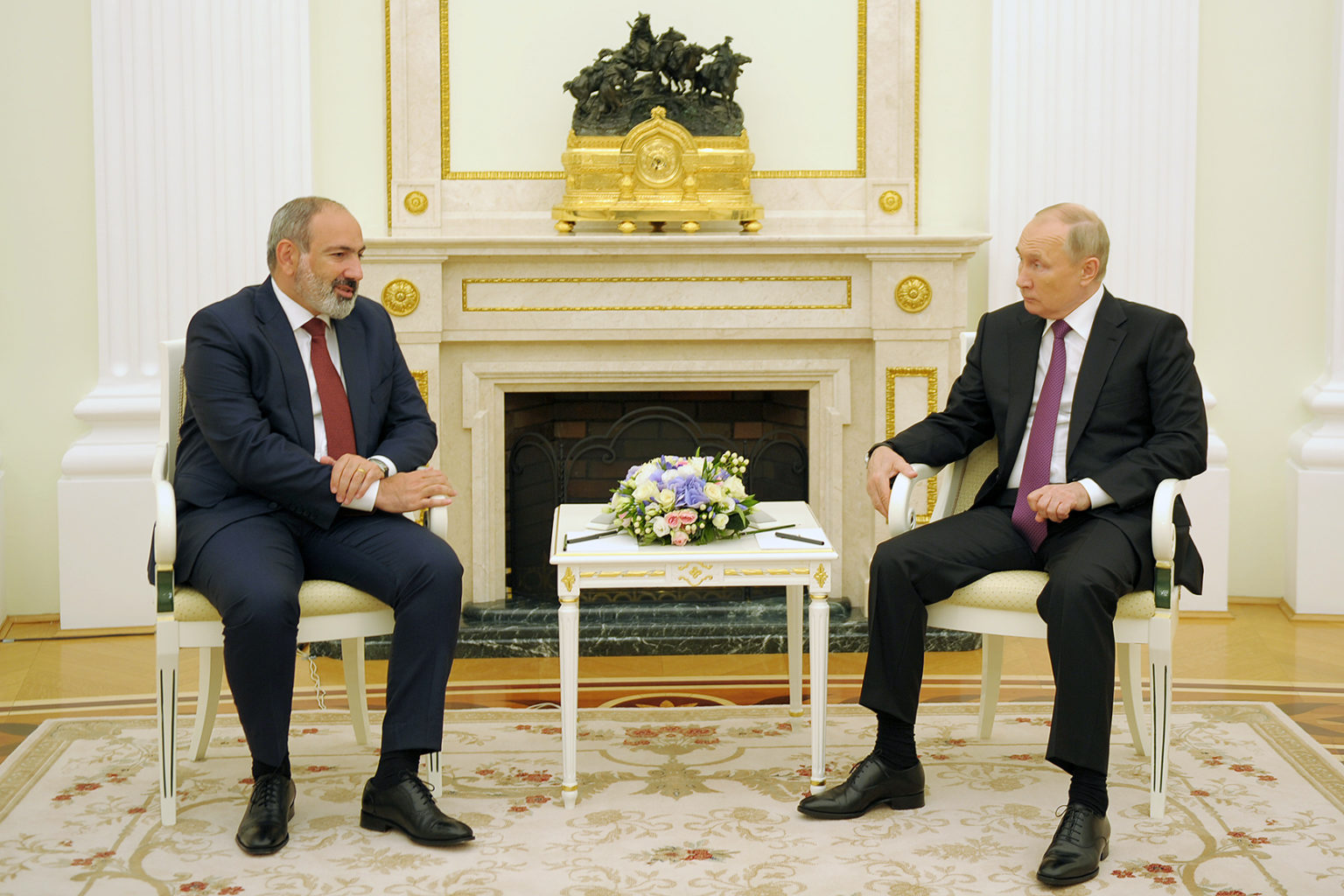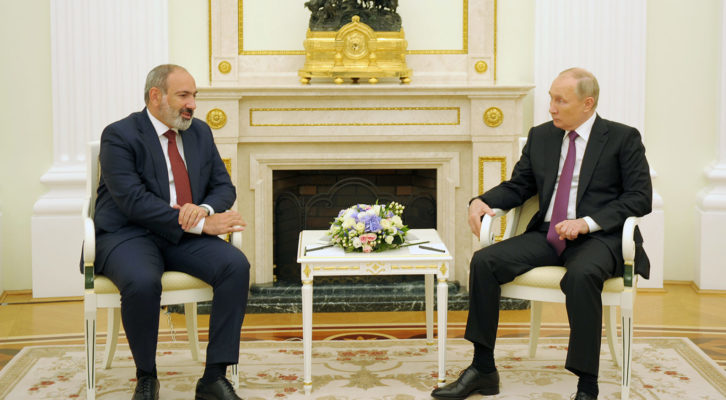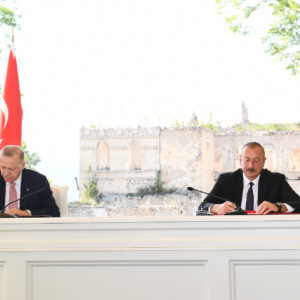
Acting Prime Minister Nikol Pashinyan pictured with Russian President Vladimir Putin during his working visit to Russia, July 7, 2021
Caretaker PM Nikol Pashinyan and his party’s euphoria from election victory will soon disappear, since for them, the post-election period will be full of foreign policy challenges linked to the post-war regional dynamics in the South Caucasus. These challenges range from Armenia’s balancing relations between the West and Russia, the status of Nagorno-Karabakh, the possibility of signing a one-sided “peace treaty” with Azerbaijan that may reintroduce the “Armenian-Turkish” Protocols, and finally, the opening of trade routes amid mounting pressures from Turkey, Azerbaijan and even Russia.
Balancing between Russia and the West
Stable relations between Russia and the West would have a positive impact on the region, however, given the tense relations between both sides, Moscow may try to use Turkey as a possible “buffer zone” to contain the “democratization” wave the West is infusing in the South Caucasus. Armenia is in a difficult position. On the one hand, the government would try to reach its Western partners to attract investments; on the other hand, its position in the field of security is fully dependent on the Kremlin. According to Kirill Krivosheev, a journalist for the Kommersant newspaper, Pashinyan has no choice but to be as loyal as possible to Moscow. Krivosheev argues that under these circumstances Armenia will not drift toward the West, as Russian spin doctors insinuate: “Pashinyan has learned from experience that it is not worth aggravating Moscow.”
However, what Pashinyan can do is redouble efforts to persuade the West that it is essential for Armenia to retain the few areas of Nagorno-Karabakh it still controls. For its part, France, Armenia’s main European ally and a member of the OSCE Minsk Group Co-Chair, will likely play a special role in this initiative. On June 25, Pashinyan received high-level European and OSCE representatives and discussed regional developments. Referring to the Nagorno-Karabakh issue, Pashinyan noted that the comprehensive settlement of the conflict should take place on the sidelines of the OSCE Minsk Group. However, little was expected from the delegation as the European Union lost its leverage over Nagorno-Karabakh when the OSCE Minsk Group was sidelined by Russia after the November 9, 2020 ceasefire.
One-sided “peace” treaty with Azerbaijan and the status of Artsakh
Can a “peace treaty” be signed without the recognition of current borders? With Turkey’s help, Azerbaijan is pressuring Yerevan to recognize Azerbaijan’s territorial integrity within Soviet Azerbaijan borders. This will mean official recognition of Artsakh as part of Azerbaijan. This would be the end of the history of Armenian Artsakh.
Azerbaijan wants Armenia to sign a “peace treaty.” The content of the deal is still unknown, but analysts argue that the deal will include Armenia’s recognition of Azerbaijan’s territorial integrity based on the 1988 Soviet map; that is, the Armenian side will recognize Nagorno-Karabakh as an “inseparable part of Azerbaijan.” Moscow already declared that it would help with the “delimitation and demarcation of the two neighbors’” borders. This can be implemented only if Russia pressures Yerevan to sign such an agreement; however, in the long run, Russia’s presence in Artsakh would be questionable as the issue of the status would be resolved within Azerbaijan’s territorial integrity. If Nagorno-Karabakh is given certain legal status within Azerbaijan “guaranteed” by Russian peacekeepers, this would only postpone the exodus of indigenous Armenians from the region.
On November 10, 2020, the International Crisis Group published “Getting from Ceasefire to Peace in Nagorno-Karabakh” in which the author argued that to have clear and sustainable peace, the parties and foreign stakeholders should work to ensure that the coming arrangements benefit the concerned parties. The article mentions that the ceasefire statement signed on November 10 fell short of implementing any peace deal due to the following reasons:
- From the Azerbaijani perspective, the outcome of the war was a clear strategic and military victory, though not a complete one. Baku won the war on the ground, however, it still does not have sovereignty over all parts of Nagorno-Karabakh. Moreover, the deployment of Russian peacekeepers puts an end to one of Baku’s points of pride – the absence of a Russian military presence on its soil since it became independent. As I have previously argued, before the war, Azerbaijan was trying to balance its foreign policy in the South Caucasus between Russia and the West. Now Baku has to balance Russia and Turkey. While Moscow and Ankara’s interests converge, Baku may feel it is on the safe side, but when these interests diverge in the long run, Baku will feel the pressure to choose sides, and it may cost Aliyev his regime.
- For the Russians, this is a satisfactory outcome, despite the fact that Russian forces do not control the strategic mountains of Artsakh. Moscow is aware, however, that its presence will not be challenged anytime soon. Moscow not only has demonstrated that it is the only outside party able to impose a ceasefire, but it is also now assured of substantial long-term leverage over both Armenia and Azerbaijan with its forces in the region for the foreseeable future. Turkey is neither signatory to nor mentioned in the deal, but Ankara also contributed to Azerbaijan’s victory with both diplomatic and military backing for Baku. Moscow has to deal with this issue as Turkey’s influence is increasing in the region and may challenge Russia in its backyard.
- For most Armenians, it amounts to surrender—both of territory seen as intrinsically Armenian and central to the nation’s identity, history and culture, and of pride in the victories of three decades ago. An unfair, one-sided peace deal would leave a generation of Armenians humiliated, planting the seeds of the next stage of conflict.
Thus the most difficult—and unavoidable—task for Pashinyan will be negotiations with Azerbaijan. The PM will likely try to postpone negotiations to buy some time or negotiate small victories, such as getting more prisoners of war released in exchange for mine maps of the newly-occupied territories of Artsakh.
After four years, Pashinyan, if he remains in power, will also have to deal with the renewal of the mandate of the Russian peacekeepers in Nagorno-Karabakh. According to the November 9 trilateral statement, “the peacemaking forces of the Russian Federation will be deployed for five years, a term to be automatically extended for subsequent five-year terms unless either Party notifies about its intention to terminate this clause six months before the expiration of the current term.” Armenia, given its weak military and complex geopolitical situation, is in no position and has no power to ask Russia to withdraw. However, what will happen if Azerbaijan—after signing a mutual defense pact with Ankara—calls for the withdrawal of Russian troops? Will Moscow adhere? Will Turkey support such an arrangement? How will Yerevan respond? These are questions that Pashinyan must think about in the coming years.
Opening of trade routes and the issue of “Zangezur Corridor”
Another foreign policy challenge is the opening of communications or trade routes. Azerbaijan demands two roads, a highway and a railway, namely one along the Araks river passing through Meghri and entering Nakhichevan, and the second highway is the Lachin – Goris – Sisian – Angeghakot – Nakhichevan. In return, according to the November 9, 2020 trilateral statement, Armenia will be connected to Russia and Iran via Azerbaijan.
The seventh point of the trilateral statement argues that “all economic and transport connections in the region shall be unblocked. The Republic of Armenia shall guarantee the security of transport connections between the western regions of the Republic of Azerbaijan and the Nakhichevan Autonomous Republic in order to arrange unobstructed movement of persons, vehicles, and cargo in both directions. The Border Guard Service of the Russian Federal Security Service shall be responsible for overseeing the transport connections.” The Shushi declaration, hinting at this article, added that “parties note that the opening of the ‘Zangezur corridor’” (note that the term “corridor” is not highlighted in the trilateral statement signed between Armenia, Azerbaijan and Russia), which will connect Azerbaijan and Turkey through the western regions of Azerbaijan and the Nakhchivan Autonomous Republic, and the construction of the Nakhichevan-Kars railway will contribute to the intensification of transport and communication ties between the two countries. It is understood that Turkey is fully supporting Azerbaijan in bringing up the “Zangezur corridor” narrative with the intention of giving these routes a similar status to that gained by Armenia regarding the status of Lachin corridor. Some Azerbaijani MPs also hinted at this by arguing that if Armenia doesn’t open a “corridor” in Syunik then Baku must block and occupy the Lachin corridor—a clear violation of the November 9 trilateral statement.
Within this context, Azerbaijani President Ilham Aliyev signed a decree on July 7 on the new division of Azerbaijan into economic regions. Two of these regions are directly related to the status of Artsakh and Armenia’s sovereignty.
One of the aims of these economic divisions is to create an economic dependency around Artsakh. According to the decree, the new “Karabakh economic region” will “ensure the restoration and rapid development of the region.” The region includes the 1988 administrative borders of Nagorno-Karabakh including Aghdam, Fizuli (Varanta), Tartar, Aghjabadi and Barda. Zankelan, Gubadli, Jabrayil (Jrakan), Lachin (Berdzor) and Karvajar districts, which are located in the eastern part of the Zangezur plateau and surrounded by the Zangezur mountain range, cover a vast territory from Lachin and Karvajar to Nakhichevan; these districts unify into one economic region called “Eastern Zangezur.” The wording in this phrase hints that Azerbaijan is trying to reproduce a false narrative over the history of Zangezur to prepare the public for a justified war in the future to “capture Western Zangezur.”
Assessment and conclusion
All the above-mentioned points may raise certain concerns that eventually, sooner or later, the agenda of the Armenian-Turkish relations will be back on the table. If the issue of Nagorno-Karabakh is resolved, as President Aliyev claims, Turkey would have no pretext to continue its blockade over Yerevan. Already many high officials from Pashinyan’s Civil Contract Party, such as former Deputy Parliamentary Speaker Lena Nazaryan, stated that Armenia must strive to establish long-term or even permanent peace with all of its neighbors. She also said in an interview that there is now a “high chance” of establishing diplomatic relations with Turkey.
Therefore, Pashinyan’s task will not be an easy one when addressing Armenia’s foreign policy challenges. Given Armenia’s limited resources and dependence on Russia after the 2020 Artsakh War, Yerevan has limited space to maneuver and may be pushed for painful compromises. For this reason, Armenia needs a clear foreign policy strategy to adapt to the geopolitical realities in the region. Since the balance of power is not in favor of Armenia, any foreign policy mistake or miscalculation by Pashinyan may cost Armenia and Artsakh dearly.







